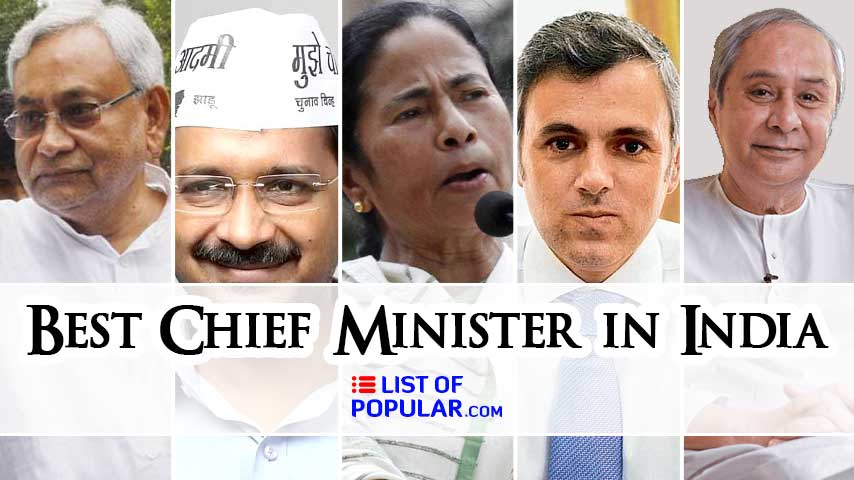In 2012, Kejriwal broke with Anna Hazare who did not want the movement to enter politics and founds the "party of the ordinary man" (Aam Aadmi Party). AAP finished second elections in Delhi in December 2013 and Kejriwal became chief minister of a coalition government. He resigned 49 days later after failing to pass an anti-corruption law. Kejriwal is named among the 100 most influential people by Time in 2014.
2. N. T. Rama Rao

3. Sushma Swaraj

She resigned from the Union Cabinet in 1998 and contested in the Delhi Assembly. From New Delhi, Hauz Khas seat, she is defeated by Congress's candidate Professor Kiran Walia. Sushma Swaraj became the first woman Chief Minister of Delhi.
4. Naveen Patnaik

5. Y. S. Rajasekhara Reddy

Rajasekhara Reddy was elected Lok Sabha four times from Kadapa to Ninth, Tenth, Eleventh and Twelfth Lok Sabha. Five times Assembly members were elected from Pulivendula. In 2003, he went on foot in Andhra Pradesh. In 2004, under his leadership the Congress won the assembly election.
6. Jyoti Basu

Joti Basu (July 8, 1914 - January 17, 2010) was a Bengali politician belonging to the Communist Party of India (Marxist) from West Bengal, India. He established a record of being India's longest Chief Minister by staying West Bengal Chief Minister from 1977 to 2000. He was a CPI (M) politburo member from 1964 to 2008.
7. K. Kamaraj

8. Narendra Modi

Narendra Damodardas Modi is the 14th Prime Minister of India from 2014 and Member of Parliament from Varanasi. He is the first person born in the independent India to be the Prime Minister of India. Before that, he has been Chief Minister of Gujarat from October 7, 2001 to May 22, 2014. Modi is a member of Bharatiya Janata Party (BJP) and Rashtriya Swayamsevak Sangh (RSS).
9. N. Chandrababu Naidu

10. Sheila Dikshit

Former Delhi Chief Minister Sheila Dikshit (born March 31, 1938). Sheila Dikshit is also a prominent politician of the Indian National Congress. In January 2009, Sheila became Chief Minister for the third consecutive term (1998 to 2013). Sheila is the second woman Chief Minister of Delhi.
11. Rajnath Singh
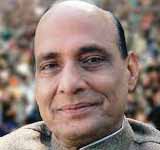
Rajnath Singh is an Indian politician. Since May 26, 2014 he served as Minister of the Home Affairs of India in the Government of Narendra Modi. In 2003 and 2004 he was Minister of Agriculture in the Atal Bihari Vajpayee government and Chief Minister of Uttar Pradesh, in office 28 October 2000 - 8 March 2002.
12. Akhilesh Yadav
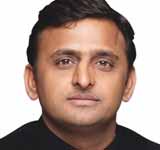
13. Oommen Chandy

14. Morarji Desai
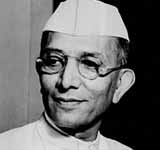
15. Pinarayi Vijayan

16. Farooq Abdullah
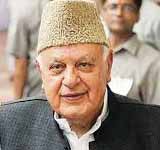
17. Gopinath Bordoloi

18. H. D. Deve Gowda

19. Parkash Singh Badal
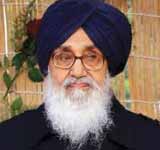
20. V. P. Singh

21. Mamata Banerjee

Mamata Banerjee (Mômota Bôndyopadhyay) is an Indian politician who has been Chief Minister of West Bengal since 2011. Banerjee had previously served as Minister of Railways twice and also became the first woman to serve as Minister of Railroad of India, Ministry of Coal, and Ministry of State for Human Resource Development, Department of Youth and Sports Affairs and Women and Child Development in the Indian government cabinet.
22. Nitish Kumar

He was first elected to the Bihar Legislative Assembly in 1985. In 1987 he became the President of Yuva Lok Dal. In 1989, he was elected Secretary of the Janata Dal in Bihar and in the same year he was also elected a member of the 9th Lok Sabha. In 1990, he joined the Union Cabinet for the first time as Minister of State for Agriculture. He was again elected to the Lok Sabha in 1991 and this time he was elected the National Secretary of the Janata Dal and also became the Deputy Leader of the Janata Dal in Parliament. He was also the Union Minister for Railways and Surface Transport for some time in 1998–1999 and he resigned from the ministerial position after the rail accident in Gasal in August 1999. Based on the development work done by his government in the 2010 Bihar assembly elections, he succeeded in winning his coalition with an overwhelming majority and again became the Chief Minister.
23. Omar Abdullah
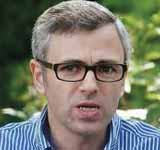
24. E. M. S. Namboodiripad

25. A. K. Antony

26. Bidhan Chandra Roy

27. J. Jayalalithaa

28. M. Karunanidhi

29. V. S. Achuthanandan

30. Buddhadeb Bhattacharya

31. C. Achutha Menon

32. Conrad Sangma

33. Dasarath Deb

34. Devendra Fadnavis

35. E. K. Nayanar

36. H. D. Kumaraswamy

37. K. Karunakaran

38. Manik Sarkar

39. Mayawati

40. Mufti Mohammad Sayeed

41. Nripen Chakraborty

42. P. K. Vasudevan Nair

43. Tarun Gogoi

44. N. Kiran Kumar Reddy

45. Ghulam Nabi Azad

46. P. V. Narasimha Rao

47. A. J. John

48. A. Subbarayalu Reddiar

49. Abdul Gafoor

50. Abdul Rehman Antulay

51. Ajit Jogi

52. Ajoy Kumar Mukherjee

53. Amarinder Singh

54. Amarsinh Chaudhary

55. Anandiben Patel

56. Anwara Taimur

57. Arjun Munda

58. Arjun Singh

59. Ashok Chavan

60. Ashok Gehlot

61. B. B. Gurung

62. B. B. Lyngdoh

63. B. D. Jatti

64. B. Gopala Reddy

65. B. Munuswamy Naidu

66. B. P. Mandal

67. Babasaheb Bhosale

68. Babu Banarsi Das

69. Babubhai J. Patel

70. Babulal Gaur

71. Babulal Marandi

72. Balwantrai Mehta

73. Banarsi Das Gupta

74. Bansi Lal

75. Barkatullah Khan

76. Beant Singh

77. Bhagat Singh Koshyari

78. Bhagwantrao Mandloi

79. Bhagwat Dayal Sharma

80. Bhagwat Jha Azad

81. Bhairon Singh Shekhawat

82. Bhajan Lal

83. Bhavanam Venkatarami Reddy

84. Bhim Sen Sachar

85. Bhola Paswan Shastri

86. Bhumidhar Barman

87. Bhupesh Baghel

88. Bhupinder Singh Hooda

89. Bhuwan Chandra Khanduri

90. Biju Patnaik

91. Bimala Prasad Chaliha

92. Binayak Acharya

93. Bindeshwari Dubey

94. Binodanand Jha

95. Biplab Kumar Deb

96. Biren Mitra

97. Bishnu Ram Medhi

98. Biswanath Das

99. Brish Bhan

100. Burgula Ramakrishna Rao

101. C. H. Mohammed Koya

102. C. Kesavan

103. C. N. Annadurai

104. C. Rajagopalachari

105. C. S. Venkatachari

106. Ch Chhunga

107. Chandra Bhanu Gupta

108. Chandrashekhar Singh

109. Charan Singh

110. Chaudhary Brahm Prakash

111. Chaudhary Devi Lal

112. Chhabildas Mehta

113. Chimanbhai Patel

114. Churchill Alemao

115. D. D. Lapang

116. D. Devaraj Urs

117. D. V. Sadananda Gowda

118. Damodaram Sanjivayya

119. Darbara Singh

120. Daroga Prasad Rai

121. Darwin Diengdoh Pugh

122. Dayanand Bandodkar

123. Deep Narayan Singh

124. Dharam Singh

125. Digambar Kamat

126. Digvijaya Singh

127. Dilip Parikh

128. Donkupar Roy

129. Dorjee Khandu

130. Dwarka Prasad Mishra

131. E. K. Mawlong

132. Edappadi K. Palaniswami

133. Edouard Goubert

134. Flinder Anderson Khonglam

135. Francisco Sardinha

136. Gegong Apang

137. Ghanshyam Oza

138. Ghulam Mohammad Shah

139. Ghulam Mohammed Sadiq

140. Gian Singh Rarewala

141. Giani Gurmukh Singh Musafir

142. Giridhar Gamang

143. Golap Borbora

144. Gopi Chand Bhargava

145. Govind Ballabh Pant

146. Govind Narayan Singh

147. Gurmukh Nihal Singh

148. Gurnam Singh

149. Harcharan Singh Brar

150. Harekrushna Mahatab

151. Hari Dev Joshi

152. Harihar Singh

153. Harish Rawat

154. Heera Lal Shastri

155. Hemananda Biswal

156. Hemant Soren

157. Hemwati Nandan Bahuguna

158. Hira Lal Devpura

159. Hitendra Kanaiyalal Desai

160. Hiteswar Saikia

161. Hokishe Sema

162. Hukam Singh

163. J. D. Rymbai

164. J. H. Patel

165. Jagadish Shettar

166. Jagannath Mishra

167. Jagannath Pahadia

168. Jai Narayan Vyas

169. Jai Ram Thakur

170. Jalagam Vengala Rao

171. Janaki Ballabh Patnaik

172. Janaki Ramachandran

173. Jarbom Gamlin

174. Jitan Ram Manjhi

175. Jivraj Narayan Mehta

176. Jogendra Nath Hazarika

177. John Bosco Jasokie

178. K. B. Sahay

179. K. Chengalaraya Reddy

180. K. Hanumanthaiah

181. K. L. Chishi

182. K. Rosaiah

183. Kadidal Manjappa

184. Kailash Chandra Joshi

185. Kailash Nath Katju

186. Kalikho Pul

187. Kalyan Singh

188. Kamal Nath

189. Kamlapati Tripathi

190. Karpoori Thakur

191. Kasu Brahmananda Reddy

192. Kazi Lhendup Dorjee

193. Kedar Pandey

194. Kesab Chandra Gogoi

195. Kotla Vijaya Bhaskara Reddy

196. Kurma Venkata Reddy Naidu

197. Lachhman Singh Gill

198. Lal Thanhawla

199. Laldenga

200. Laxmikant Parsekar

201. Longjam Thambou Singh

202. Luis Proto Barbosa

203. Luizinho Faleiro

204. M. Bakthavatsalam

205. M. D. R. Ramachandran

206. M. K. Vellodi

207. M. O. H. Farook

208. M. Veerappa Moily

209. Madan Lal Khurana

210. Madhav Singh Solanki

211. Mahamaya Prasad Sinha

212. Mahendra Mohan Choudhry

213. Mairembam Koireng Singh

214. Manohar Joshi

215. Manohar Lal Khattar

216. Marotrao Kannamwar

217. Marri Chenna Reddy

218. Mohammed Alimuddin

219. Mohan Lal Sukhadia

220. Motilal Vora

221. Mukul Sangma

222. Mukut Mithi

223. N. D. Tiwari

224. N. Janardhana Reddy

225. N. Rangaswamy

226. Nabakrushna Choudhury

227. Nabam Tuki

228. Nadendla Bhaskara Rao

229. Nandini Satpathy

230. Nar Bahadur Bhandari

231. Narayan Rane

232. Nareshchandra Singh

233. Neelam Sanjiva Reddy

234. Neiphiu Rio

235. Nilamani Routray

236. Nityanand Swami

237. Nongthombam Biren Singh

238. O. P. Ramaswamy Reddiyar

239. O. Panneerselvam

240. Okram Ibobi Singh

241. Om Prakash Chautala

242. P. A. Sangma

243. P. K. Sawant

244. P. S. Kumaraswamy Raja

245. P. Shanmugam

246. P. Shilu Ao

247. P. Subbarayan

248. P. T. Rajan

249. Panampilly Govinda Menon

250. Partap Singh Kairon

251. Parur T. K. Narayana Pillai

252. Pattom A. Thanu Pillai

253. Pawan Kumar Chamling

254. Pema Khandu

255. Prafulla Chandra Ghosh

256. Prafulla Chandra Sen

257. Prafulla Kumar Das

258. Prafulla Kumar Mahanta

259. Prakash Chandra Sethi

260. Pramod Sawant

261. Pratapsingh Rane

262. Prem Khandu Thungan

263. Prem Kumar Dhumal

264. Prithviraj Chavan

265. R. Gundu Rao

266. R. Sankar

267. R. V. Janakiraman

268. Radhabinod Koijam

269. Radhika Ranjan Gupta

270. Raghbir Singh

271. Raghubar Das

272. Raj Kumar Dorendra Singh

273. Raj Kumar Jaichandra Singh

274. Raj Kumar Ranbir Singh

275. Raja of Bobbili

276. Raja of Panagal

277. Rajendra Narayan Singh Deo

278. Rajinder Kaur Bhattal

279. Ram Kishan

280. Ram Naresh Yadav

281. Ram Prakash Gupta

282. Ram Sundar Das

283. Ramakrishna Hegde

284. Raman Singh

285. Rao Birender Singh

286. Ravi S. Naik

287. Ravishankar Shukla

288. Rishang Keishing

289. S. Bangarappa

290. S. C. Jamir

291. S. C. Marak

292. S. M. Krishna

293. S. Nijalingappa

294. S. R. Bommai

295. S. R. Kanthi

296. Sachindra Lal Singh

297. Sadashiva Tripathy

298. Sahib Singh Verma

299. Samir Ranjan Barman

300. Sampurnanand


